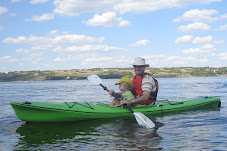This week we tried our hands at some quiz authoring with Hot Potatoes, a freely available quiz editor which can create html web pages. The main goal was to get some quick hands-on experience in making a simple gap-fill quiz, and it seems that the technology was no problem at all. We were able to view the quiz on our own computers, but we have yet to learn how to upload it to the server and publish it (we are going to use the Bb content collection for this). I have to admit that we didn't pay a lot of attention to the content of the quiz, which was rather secondary to technical mastery to begin with, so we are going to have to focus on that aspect of things more in future.
Hot Potatoes may not be exactly as exciting as Second Life (see my previous post), but it is still good at what it does, which is authoring quizzes. It has a range of possible quizzes and you can set up multimedia as well (i.e. images and audio/video). The interface is still easy to use, the main technical problem comes when you want to customize and publish, which is nowhere near as easy as what we have come to expect, with all those web 2.0 tools that make customizing and publishing such a cinch.
What are your thoughts about quiz authoring with Hot Potatoes? Do you know of any other quiz authoring platforms? How do they compare?
Wednesday, February 24, 2010
Tuesday, February 9, 2010
Second Life in Language Education
Last night we spent about an hour exploring Second Life together and evaluating the possibilities for use in language education. The process was fairly unstructured, with most people starting off in Orientation Island and getting the hang of the controls, before moving on to select a destination of their own, or explore one of Renaissance Island, Mont St. Michel, or the International Space Flight Museum (as examples of the different kinds of environments that can be found in SL). Some of use chose and evaluated our own destination, based on searches and with the help of the b-places website.
We did encounter some problems, technology-wise, with some of the computers in the room unable to support the SL client, because of problems with the graphics card, and other computers simply being unbearably slow. The technology problems notwithstanding, it takes a while to get the hang of SL and work out the point of it, so a number of us arrived and got to wondering what to do next. This problem could be addressed with a more structured task (for example a scavenger hunt), but the lack of structure also added to the activity, in that we were able to play with a variety of environments and report back on some diverse experiences afterwards. It would also seem that if language educators are going to make use of SL in their delivery, then what is really required is some kind of ongoing project, which includes an initial period of orientation and play in the various environments that are available.
After diving into SL in this way, it was helpful to review the ways in which it could be used, and this video (via the ICT4LT site) is particularly useful for that:
What's your experience of Second Life?
We did encounter some problems, technology-wise, with some of the computers in the room unable to support the SL client, because of problems with the graphics card, and other computers simply being unbearably slow. The technology problems notwithstanding, it takes a while to get the hang of SL and work out the point of it, so a number of us arrived and got to wondering what to do next. This problem could be addressed with a more structured task (for example a scavenger hunt), but the lack of structure also added to the activity, in that we were able to play with a variety of environments and report back on some diverse experiences afterwards. It would also seem that if language educators are going to make use of SL in their delivery, then what is really required is some kind of ongoing project, which includes an initial period of orientation and play in the various environments that are available.
After diving into SL in this way, it was helpful to review the ways in which it could be used, and this video (via the ICT4LT site) is particularly useful for that:
What's your experience of Second Life?
Subscribe to:
Posts (Atom)
